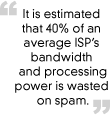Spam: more than an annoyance
 Spam, or unsolicited bulk email is infuriating. They force advertising on you, misusing a service, your email account, that you already paid for. It steals your resources, like hard disk space, CPU cycles and bandwidth: You are paying for the delivery of this trash, like junk faxes, or telemarketing calls to your cell phone. It is estimated that 40% of an average ISPs bandwidth and processing power is wasted on spam. The cost is passed on to us, customers and corporations (costing almost $1000 per employees per year). Smaller ISPs have gone out of business because they couldn't handle the load. More importantly, it robs us of our time by covertly mixing itself with our valid messages, using misleading titles, always trying to avoid filtering methods.
Spam, or unsolicited bulk email is infuriating. They force advertising on you, misusing a service, your email account, that you already paid for. It steals your resources, like hard disk space, CPU cycles and bandwidth: You are paying for the delivery of this trash, like junk faxes, or telemarketing calls to your cell phone. It is estimated that 40% of an average ISPs bandwidth and processing power is wasted on spam. The cost is passed on to us, customers and corporations (costing almost $1000 per employees per year). Smaller ISPs have gone out of business because they couldn't handle the load. More importantly, it robs us of our time by covertly mixing itself with our valid messages, using misleading titles, always trying to avoid filtering methods.
 If you ever published your address on the web, be it on Usenet groups or on your web page, you probably get 50 or more spams a day (to be conservative, and it is getting worse as we speak), because they blindly scan the web for anything resembling an email address. Contrary to what they say, free speech doesn't force us to hear what others have to say, to receive mail against our wishes, or to pay for it. Initial and necessary consent is absent. Spammers are parasites, they do not subsidize the services they advertise on that could be useful or enjoyed by users, as is the case with legitimate advertising in TV, billboards, web sites, magazines, radio, etc. They pose a threat to e-commerce and e-marketing by giving it a shady reputation.
If you ever published your address on the web, be it on Usenet groups or on your web page, you probably get 50 or more spams a day (to be conservative, and it is getting worse as we speak), because they blindly scan the web for anything resembling an email address. Contrary to what they say, free speech doesn't force us to hear what others have to say, to receive mail against our wishes, or to pay for it. Initial and necessary consent is absent. Spammers are parasites, they do not subsidize the services they advertise on that could be useful or enjoyed by users, as is the case with legitimate advertising in TV, billboards, web sites, magazines, radio, etc. They pose a threat to e-commerce and e-marketing by giving it a shady reputation.
 Free Anti Spam lists free resources available to help you fight back, whether with filtering technologies for your email client, like Outlook Express or Mozilla Thunderbird, or utilities to help you report spam to authorities. You will also find some basic primers to help you avoid spam, and other articles on spam related nuisances such as spywares.
Free Anti Spam lists free resources available to help you fight back, whether with filtering technologies for your email client, like Outlook Express or Mozilla Thunderbird, or utilities to help you report spam to authorities. You will also find some basic primers to help you avoid spam, and other articles on spam related nuisances such as spywares.
Free anti spam and spyware programs
"Americans are drowning in commercial spam email today and this situation is only going to get worse unless strong action is taken now. We are urging that the Federal Trade Commission take steps now to halt the outrageous excesses of unsolicited bulk email senders."
- Samuel A. Simon, chairman, Telecommunications Research & Action Center

